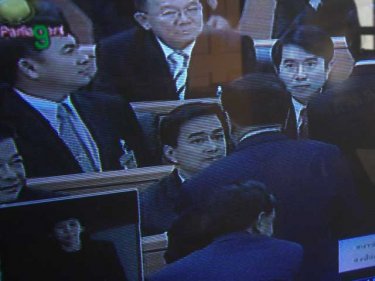Latest Update: Parliament Blocked
TODAY's victory for 44-year-old Prime Minister Abhisit Vejjajiva in Bangkok represents a turning point for the Phuket region and tourism, as well as Thailand.
Victory for the young Democrat Party candidate is the best possible chance to save the island and the nation from further catastrophe.
A win to the Puea Thai party, the next-in-line successor to eight years of Thaksin rule, would have paved the way to the edge of the yawning abyss.
News of Abhisit's formal victory by 235 votes to 198 immediately brought angry protests from red-shirted supporters of the former government, who blocked the gates of Parliament before police intervened.
Their violent reaction is an indication that perhaps Thailand's political problems will not be solved for some time yet.
As the AFP news agency reported before the vital vote: ''MPs will Monday choose Thailand's third prime minister in four months, with opposition leader Abhisit Vejjajiva on the verge of the premiership after the pro-Thaksin government was brought down by a court order and hit by defections.''
The individual votes of MPs were made one by one this morning, after one minute's silence for a Democrat MP who died before he could vote.
Sombat Sithikornwong from Nonthaburi, who was expected to attend the House session in a wheel chair because he was in hospital, passed away early on Monday morning.
Some of the MPs made comments as their votes were recorded.
''I strongly support Abhisit because he will save the country,'' said one MP from the northern province of Loei, to murmurs around the Parliamentary chamber.
Parties loyal to the legacy of shamed prime minister Thaksin Shinawatra also claimed to have enough votes to name their candidate, former national police chief Pracha Promnok, to the top spot. But they got it wrong.
The vote concluded at 10.55am and a formal announcement came minutes later, sparking angry scenes from red-shirted supporters of the former government.
Even with Abhisit in charge, the Andaman region faces one year or more of certain pain.
Tourists may be seen around resorts and in the streets now, and more are booked for January and February, although numbers are well down on normal.
From March, everything stops. There are virtually no forward bookings.
Nationwide, the international orders for electronics equipment dry up about then, too.
While the global economic slowdown can be blamed for job losses in the industrial sector, the airports blockade is the direct cause of the tourism industry's woes.
The People's Alliance for Democracy may consider thousands of jobs a price worth paying for a change in Government.
Many other people, who would otherwise support the PAD's cause, do not.
Tour operators in Europe have turned against Thailand, with other destinations, especially Bali, benefitting from Thailand's fall from grace.
The tourists who are here now and who are planning to come in January and February are coming because they have paid deposits and do not wish to lose their money.
Tour operators in Europe now face potential legal action, which accounts for their reluctance to endure another Bangkok airports blockade, or some similar outrage against innocent travellers.
Guy-Robert '''Charlie'' Lidureau, the MD of Seafarer Divers and the Thailand Diving Association Representative for Phuket Province, pointed out the obligation of tour operators in Britain.
Since 1993, as a result of an EC ruling, direct responsibility has been placed on tour operators for the safety of their customers.
''Tour operators are legally responsible for the components of the package - coach transfers, hotels etc, if negligence is proved. They cannot avoid responsibility by attributing it to their sub-contractors.
''UK customers can sue operators in UK courts and no longer have to pursue action against contractors in overseas courts.''
Plainly, tour operators in Europe are hardly going to place their customers and their revenue at risk by sending people to a destination where misguided political action may destroy their holiday plans.
Much better to send them to Bali, where there is no political unrest, and where the Indonesians understand the importance of a stable, secure environment for tourists.
Khun Abhisit, Thailand's 27th Prime Minister and the youngest ever, has been leader of the opposition since 2005. He faces enormous challenges in 2009.
The recovery of Thailand's tourist industry should be close to the top of the list.
*Updating report: Look for more later
The Bangkok Post reports today that international airlines are asking Thailand to pay for the cost of disruption and loss of revenue resulting from the eight-day seizure and shutdown of Suvarnabhumi Airport by anti-government protesters.
''They do not want to see the costs incurred by Airports of Thailand (AoT), which operates Bangkok's international airport, as it might have to raise airport charges and thus affect carriers that are already struggling in a poor economy,'' the report says.
''The International Air Transport Association (IATA), which represents 230 airlines accounting for 93 percent of scheduled international air traffic worldwide, outlined its stance in a letter sent last week to Serirat Pasutanond, the acting president of AoT.''









